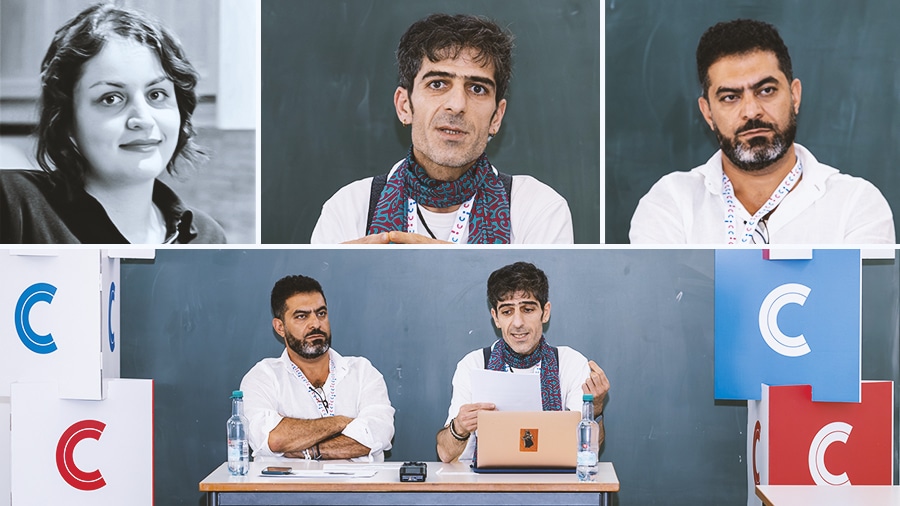Kaveh Ghoreishi
Politics and Religion in Kurdistan: Liberation Theology between the Iranian Revolutions of 1979 and the Jîna Amînî-Uprising of 2022
Nastaran Saremy
From the History to the Histories of a Revolution: The Kurdish Orientation
Moderator: Behdad Bordbar
In this panel entitled “Resistance from the Periphery: Memory, Theology and Political Struggles in Kurdistan”, two speeches were presented by Kaveh Ghoreshi and Nastaran Saremi, which examine the role and impact of Kurdish resistance in the history and politics of Iran and Kurdistan.
These two presentations are dedicated to the historical, theological and political analysis of this resistance and how it interacts with the larger movements of Iran from the 1979 revolution to the uprising of Mahsa Amini in 2022.
Kaveh Ghoreishi: Politics and Religion in Kurdistan: Liberation Theology between the Iranian Revolutions of 1979 and the Jîna Amînî-Uprising of 2022
The Sunni clerics of Kurdistan have long been integral to the movements, activism, and political upheavals within the regions where Kurds reside, spanning over a century. Figures like Sheikh Saeed Piran, Sheikh Mahmoud Malek, Qazi Mohammad, and Mullah Mustafa Barzani exemplify the religious leadership within Kurdistan, each having played significant roles in guiding Kurdish political movements during their lifetimes.
The assessment of clerical influence within social and political movements in Kurdistan is contingent upon the context of their time and place. Over the past century, the role of clergy has evolved gradually from direct leadership to one of support and solidarity.
Nonetheless, throughout various historical periods, in contrast to the Iranian central regime, the clerics of Kurdistan have not actively pursued power or advocated for a religiously-based governance system.
This presentation specifically aims to explore the involvement of clerics and their interaction with the broader Kurdish movement in Eastern Kurdistan (Rojhelat Kurdistan) through the lens of liberation theology.
In my talk, I intend to establish a historical and theoretical framework concerning political or liberation theology, analysing the clergy’s relationship with the social fabric, organisations, and political parties of Kurdistan from the 1979 revolution to the Jîna uprising in 2022.
Nastaran Saremy: From the History to the Histories of a Revolution: The Kurdish Orientation
This presentation starts with explaining how Kurdish resistance is erased and trivialised in the state-centred and nationalist narrative of Iran’s modern history. Placing the fragments from the biographical and the collective pasts within the historical framework, this paper is an attempt to form alternative means of revealing historical relations and trajectories that inform resistance in Kurdistan.
In doing so, I will expound upon the underpinning historical orientation that gives shape, direction and meaning to the struggles. I will discuss how Kurdish struggles and history break the homogenous, univocal temporal order in which the dominant national narrative of post-revolutionary Iran has been narrated.
The dominant account of post-revolutionary creates a ‘single ideological base time’ Iran which is built upon the erasure of revolutionary memory and the suppression of “othered” social imaginaries associated with it. I will argue how the Kurdish Revolution provides a historical basis upon which the present struggles are played out and continues to inform the masses.
Drawing on Mark Rifkin’s formulation of temporal sovereignty and Indigenous self-determination, I will discuss how elements of temporal experience such as material experience of patterns of individual and collective memory, the legacies of historical events and dynamics, and consistent or recursive forms of inhabitance provide a background, a frame of reference, which gives shape, direction, and meaning to the struggles.
What makes Kurdish civic resistance different from that more generally within Iran is in terms of its effectiveness, its excess that lies in this specific orientation in resistance in which various struggles–such as mass marches, subaltern uprisings, mourning rituals, environmentalism, workers and feminist struggles, have become intertwined within another temporal framework in which experiences, sensations, and possibilities for action are shaped and oriented by the existing inclinations, itineraries, and networks in which one is immersed.


